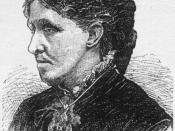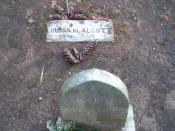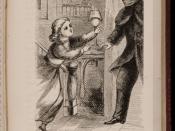A Biographical Interpretation of Little Women
The novel, Little Women, is an accurate symbol of nineteenth century ideals; however it serves as an even more precise glance into the life of its author, Louisa May Alcott. In fact, when delving into the realm of Alcott's real-life biography and into the novel itself, it is often difficult to separate fact from fiction. The main characters found in Little Women are clearly based upon Alcott and her family; moreover, the maternal instincts and internal struggles that Alcott shouldered during her lifetime can also be found within much of the storyline of the novel. In addition, the author's attitudes towards Victorian societal ideals are demonstrated, as well as the similarities and differences of the attributes she gives to the novel's characters and to the actual members of her family.
One of the most prominent internal struggles that Alcott renders in the novel is her own feelings of guilt and inadequacy for being an independent, willful young woman during a time in which women were regarded as mere ornaments, shiny and pretty, but of no real intellectual value.
This attitude was one that her real-life father, Bronson Alcott, subscribed to wholeheartedly, along with beliefs such as "children were tabulae rasae... that lighter coloring (like his) betokened a deeper spirituality and closer connection to divinity" (Wells). The fact that Louisa had dark hair, not to mention a flair for voicing her opinion and desires, led Bronson to view her as somewhat of a challenge, and he dedicated much of his energy to correcting her unruly ways. Although Alcott does not bring this conflict openly to the storyline of the novel, she does express feelings of underlying guilt for not submitting to her father's ideals or expectations. Bronson's moralistic views can be found in the first...


